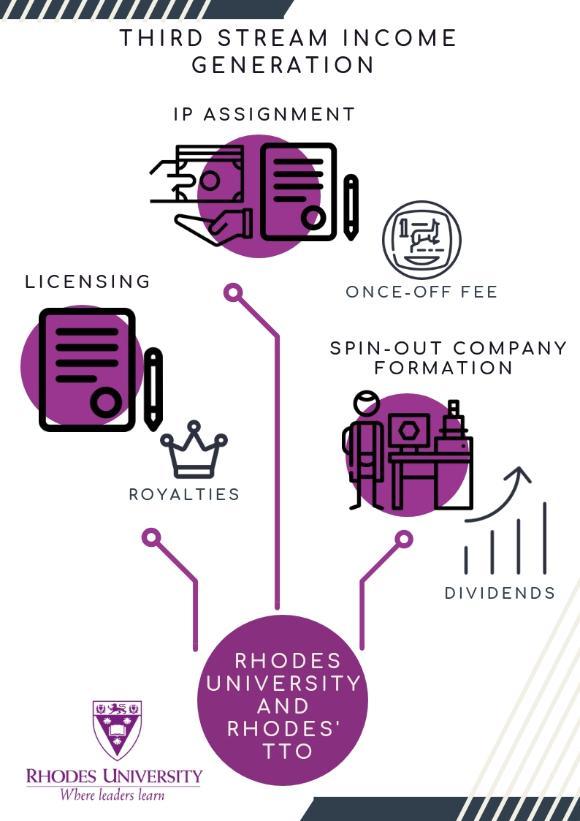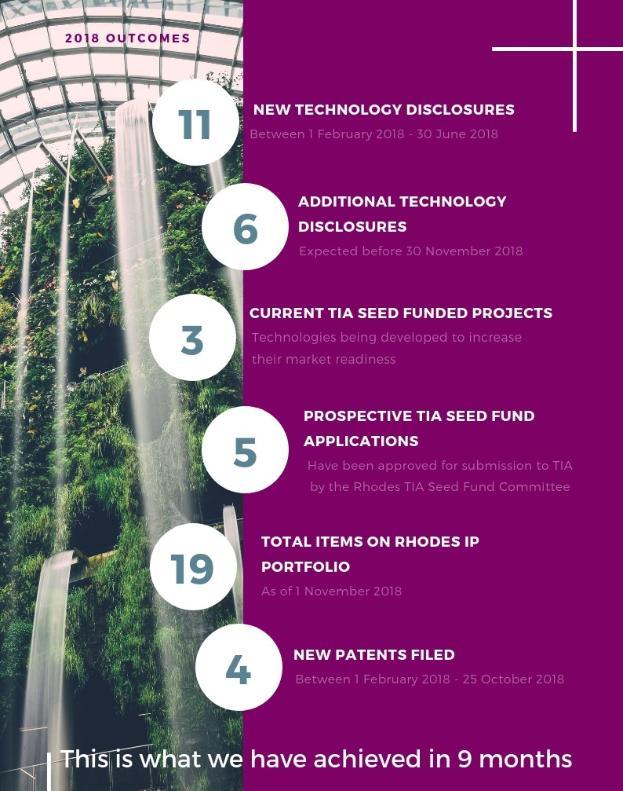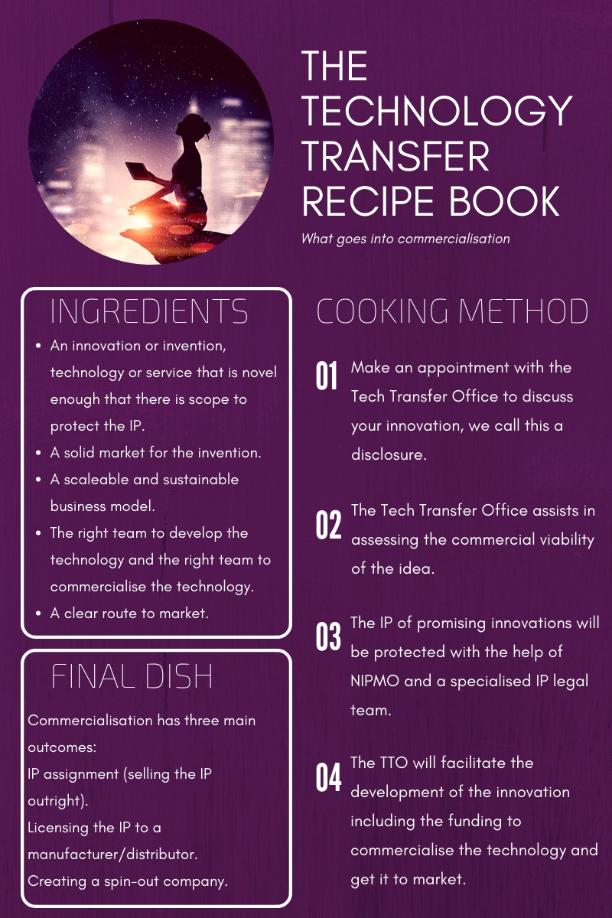Technology Transfer, is the process of transferring intellectual property (including skills, knowledge, technologies, innovative methods and designs) among governments or universities and third parties or other institutions. This is to ensure that scientific and technological developments are accessible to a wider range of users who can then further develop and exploit the technology into new products, processes, applications, materials or services. While it is closely related to knowledge transfer, its focus tends more towards the protection of novel intellectual property (IP) emanating from Universities, and the commercialisation thereof. Most consider technology transfer as a process of moving promising research topics into a level of maturity ready for large scale production or translation into the market.
This means that protectable intellectual property (IP) emanating from the University becomes a commodity. How that IP is managed and developed can heavily influence the commercial success of the innovation and has immense implications for the sustainability of Higher Education Institutions (HEIs) and for broader social and economic impact.
As South African Universities are publicly financed, we must comply with the IPR Act 2008Intellectual Property Rights from Publicly Financed Research and Development or the South African IPR-PFRD Act, 2008 (Act 51 of 2008) and its regulations.
The overarching purpose of the IPR-PFRD Act is to ensure that the Intellectual Property (IP) emanating from publicly financed Higher Education Institutions (HEIs) is identified, protected and utilised to be commercialised for the benefit of the people of the Republic of South Africa.
While it is obvious how wider societal benefits include job creation, skills creation and a contribution towards the Gross Domestic Product of the South African Economy, the benefits specific to Universities include:
With that in mind, the role of the Technology Transfer office is to identify, protect and commercialise the IP coming from the University in a manner that is aligned with the Act and maximally beneficial to the University.
The Regulatory body governing which encourages the development of intellectual property assets by South African researchers and ensures that South African citizens receive the benefits of publicly funded research is the National Intellectual Property Management Office (NIPMO), please visit their website here: https://nipmo.dst.gov.za/
The vision of the Rhodes University Technology Transfer Office in particular is to successfully protect and commercialise the promising Intellectual Property emanating from Rhodes University, but in a context-appropriate way that will benefit the local socio-economic milieu as much as possible. In other words, we want the impact of commercialising Rhodes IP to be evident in Makhanda and the Eastern Cape, more than anywhere else.
Ultimately, the successful exploitation of IP has three possible outcomes:

In all three cases benefit sharing is implemented such that, the University, the technology inventors and developers as well as the community sees recognition, remuneration and other economic benefits. The current benefit sharing structures are outline in the Rhodes Intellectual Property Policy (Rhodes University IP Policy).

What is a Technology Disclosure?
We encourage research investigator or IP creator who have identified a discovery or innovation which he or she believes may have potential for commercial development. Irrespective of the field this discovery falls in, we call it a technology.
The inventor(s) or creator(s) can come to the Technology Transfer Office and discuss the disclosure form (Technology Disclosure Form), if it is promising the inventor submits a disclosure form describing the innovation. After receipt of a complete disclosure form, an assessment of the invention’s technical and marketing potential is conducted, and if it is viable the Technology Transfer Team will assist the inventor/creator to proceed with Technology Transfer process, including securing funding and developing the technology in preparation for commercialisation.

Rhodes University wishes to work with industry and commercial partners as much as possible, and it is our sincere hope that industry will approach the University to design solutions for industry challenges. Thus we work carefully to ensure that the IP is always protected, but that is not to say it is not transferable or exploitable by third parties.
The National Intellectual Property Management Office (NIPMO) is an entity within the Department of Science and Technology (DST) which ensures the Act is implemented. As such, NIPMO has created guidelines (NIPMO Guideline 4.1 of 2015: Intellectual Property Ownership) which make provision for 3 positions on IP ownership:
|
The Default Position |
Co-Ownership |
Full-cost Arrangement |
|
IP emanating from publicly financed research and development shall be owned by the recipient”. A “recipient” is defined as “any person, juristic or non-juristic, that undertakes research and development using funding from a funding agency and includes an Institution”. A “funding agency” is further defined as the “State or an organ of state or a state agency that funds research and development”2. Thus the default position on IP ownership in terms of the IPR Act is that (if the requirements for co-ownership are not met) the recipient that undertakes R&D using funding received from a funding agency will be the owner of any IP that emanates from that R&D. |
“Any private entity or organisation may become a co-owner of the intellectual property emanating from publicly financed research and development undertaken at an institution if – (a) There has been a contribution of resources, which may include relevant background intellectual property by the private entity or organisation; (b) There is joint intellectual property creatorship; (c) Appropriate arrangements are made for benefit-sharing for intellectual property creators at the institution; and (d) The institution and the private entity or organisation conclude an agreement for the commercialisation of the intellectual property.” Note: All four requirements (a) to (d) above must be met for IP generated from publicly financed R&D to be co-owned. |
If a private entity or organisation to pay the full-cost of R&D undertaken at an institution, such that the R&D is deemed not to be publicly financed and the provisions of the IPR Act do not apply. It should, however, be noted that the IP ownership does not automatically belong to the full-cost funder (i.e. private entity or organisation). As the IPR Act does not apply, IP ownership will be determined in terms of applicable IP statutes and contractual arrangements. In the case where the IP belongs to the institution, the institution has the discretion to make the IP available by assigning or licensing the IP, at no further cost, to the private entity or organisation. Alternatively, the parties may negotiate a further margin for the transfer of (assignment) or access to (licence) the IP. |
To find out more about the NIPMO guidelines please visit: https://nipmo.dst.gov.za/resources

Technology Disclosure Form? - The Form you will complete when you disclose information relating to a discovery, new business idea, technology or invention. This will enable the individual and the Rhodes Technology Transfer Office to explore whether the idea has commercial merit, exploit such an idea commercially in partnership, while simultaneously protecting the rights of the inventors and entrepreneur(s).
Template for Non-Disclosure Agreement (NDA)? – to be used when as an agreement with businesses to protect the novelty of your IP
Template for Materials Transfer Agreement (MTA) – to be used when materials, such as plasmids or designs, where the IP is yet to be protected, are sent to a third party for testing or development, or separate research but you wish to protect the IP, ensuring the other party may not exploit or commercialise Rhodes IP
Template Suggested Memorandum of Understanding for Third Parties (MOU) – Typically used for commercial partnerships or joint ventures
Template Suggested Research Collaboration Agreement – Typically used when collaboration between the University and a third party (such as industry or a business) is exploring a potential technology through research and development together
Guidelines for Essential IP Elements for Rhodes Contracts– A short guideline de-mystifying the manner in which Rhodes deals with IP ownership intended for third parties, funders, commercial partners and investors
TIA Seed Fund Application Template
Rhodes Technology Transfer Snapshot – Outcomes 2018
NIPMO Guideline 4.1 of 2015: Intellectual Property Ownership
Onlie Resources: The National Intellectual Property Management Office (NIPMO) is the implementation and regulatory body of the IPR Act, to find out more please visit their website here: https://nipmo.dst.gov.za/
Last Modified: Thu, 27 Jun 2019 08:28:11 SAST